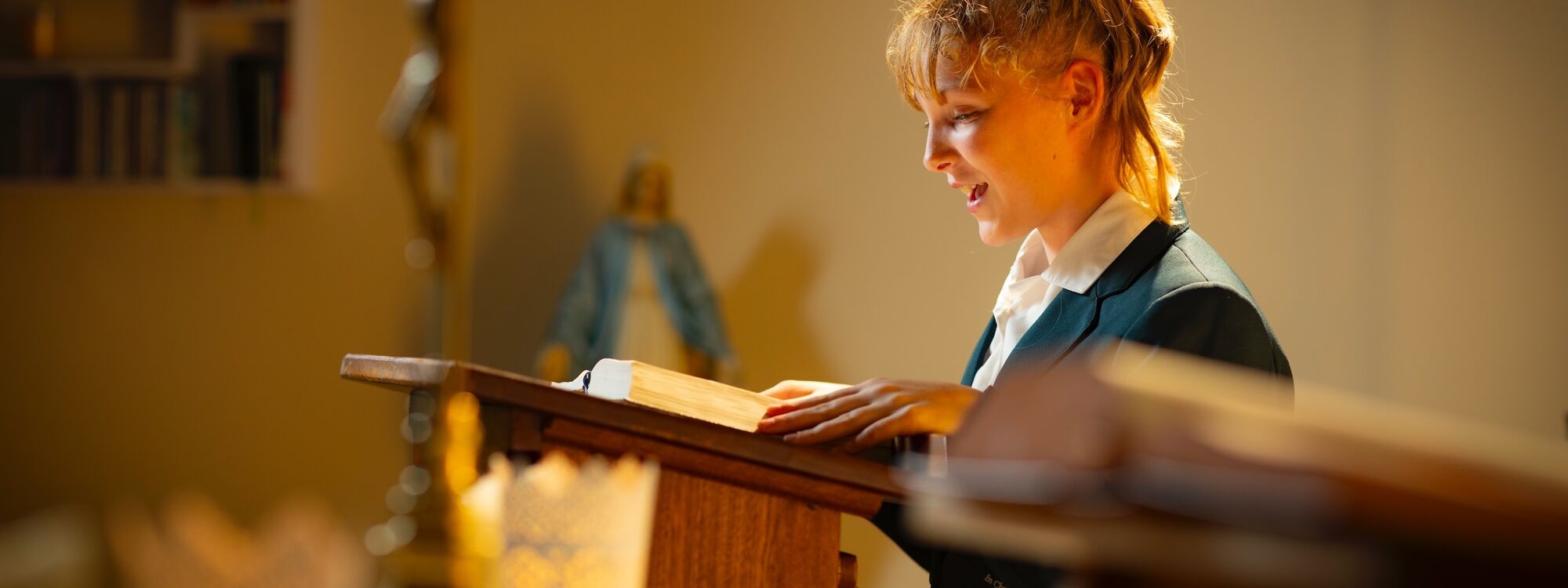- Home
- Curriculum
- Subject Information
- RE
RE
Curriculum Intent
At the heart of Catholic education lies the Christian vision of the human person. This vision is expressed and explored in Religious Education lessons at St Gregory’s. All students will receive an overall education which will enable them, in the light of the faith of the Church, to engage with the deepest questions of life and the reason for the hope which is within them (1 Peter 3:15).
The Curriculum in RE aims to provide our students with the ability to ask big questions relating to humanity’s relationship with God and the implications of belief in this relationship and belief in non-religious world views. It is varied and robust.
Through lived experience of students in the classroom, we intend students develop a strong sense of respect for the values, opinions and beliefs of others. In addition that they recognise the value and importance of human dignity and Catholic Social Teaching.
We intend that students will become religiously literate and are able to express their views and justify their opinions. Skills such as analysing, constructing arguments, making judgements, synthesising, evaluating, recognising diversity and interpreting, are developed in order to meet these aims.
Key Stage 3
The RE curriculum includes a comprehensive and systematic study of the mystery of God, the teachings of Jesus Christ, the teachings of His Church, the central beliefs that Catholics hold and the basis for them and the relationship between faith and life. This will be taught in a manner which encourages investigation and reflection by students, and the development of appropriate skills and attitudes, promoting a free, informed and full response to God’s call in everyday life. The Curriculum must be substantive in content and concepts and allow students to understand their own relationship to the subject matter.
Topics and concepts are taught on a spiral curriculum, with prior knowledge and recall used to build upon existing knowledge or introduce new concepts effectively. The liturgical year is reflected within each topic.
- Creation & Covenant
- Prophecy & Promise
- Galilee to Jerusalem
- Desert to Garden
- To the Ends of the Earth
- Dialogue & Encounter
Key Stage 4
Course code: GCSE Eduqas GCSE (9-1)
Exam Board Specifications: http://www.eduqas.co.uk/qualifications/religious-studies/ gcse/eduqas-gcse-RS-specfull-from2016 Route B/
The Curriculum in RE aims to provide our students with the ability to ask big questions relating to humanity’s relationship with God and the implications of belief in this relationship and belief in non-religious world views.
GCSE Religious Studies takes a distinctive issues based approach to the study of religious, philosophical and ethical studies in the modern world. The course will also enable learners to gain knowledge and understanding of two religions.
GCSE Religious Studies provides opportunities for learners to understand more about the world, the religious challenges it faces and their place within it. Following the GCSE course will deepen understanding of religions and their effect on society. It will develop learners' competence in a wide range of skills and approaches and enable young people to become religiously informed and thoughtful, engaged citizens.
Topics studied are:
- Origins and Meaning
- Good and Evil
- Life and Death
- Sin and Forgiveness
- Judaism Beliefs
- Judaism Practices
Key Stage 5
Core RE
The Curriculum in Core RE (Religion and Life) aims to provide our students with the ability to ask big questions relating to humanity’s relationship with God and the implications of belief in this relationship and belief in non-religious world views. It is varied and robust.
We intend that students post – 16 develop a strong sense of respect for the values, opinions and beliefs of others. In addition that they recognise the value and importance of human dignity and social justice. They are reflective of their own lives, communities and the wider world. They are beginning to think how their life choices impact the issues we study.
Skills such as analysing, constructing arguments, making judgements, synthesising, evaluating, recognising diversity and interpreting, are embedded in order to meet these aims.
A Level
The WJEC Eduqas A Level specification contains three components which include a wide range of topics for consideration, including an in-depth and broad study of Christianity, philosophy of religion, religion and ethics.
It is our intention that A level students:
- Develop their interest in a rigorous study of religion and belief and relate it to the wider world
- Develop knowledge and understanding appropriate to a specialist study of religion
- Develop an understanding and appreciation of religious thought and its contribution to individuals, communities and societies
- Adopt an enquiring, critical and reflective approach to the study of religion
- Reflect on and develop their own values, opinions and attitudes in the light of their study.
A level Religious Studies is designed to enable learners to develop their interest in, and enthusiasm for, a study of religion and its place in the wider world.
